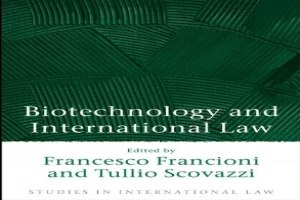Newly released
This book is new and will be uploaded as soon as it becomes available to us and if we secure the necessary publishing rights.

Biotechnology And International Law Book PDF
(0)
Author:
Francesco FrancioniNumber Of Reads:
71
Language:
English
Category:
Social sciencesSection:
Pages:
486
Quality:
good
Views:
1131
Quate
Review
Save
Share
New
Book Description
As with any rapid technological development, the biotechnology revolution is putting great strains on the ability of law to adapt to new challenges and threats. Although there is general agreement on the need to regulate biotechnology in many different fields of human activity (agriculture, life sciences, forensic science), domestic law remains deeply divided over the best approach to take. This book is the first major work to cover the most pressing legal issues raised by the impact of biotechnologies on different categories of international norms. Through the contribution of a select group of international scholars and experts from international organizations, the book addresses: the international status of genetic resources, both in areas of national jurisdiction and in common spaces such as the international sea bed area and Antarctica; the relevance of environmental principles in the governance of modern biotechnologies; the impact of biotechnologies on trade rules, including intellectual property law; the human rights implications, especially in the field of human genetics; and the intersection between general international law and regional systems, especially those developed in Europe and Latin America.
Francesco Francioni
Francesco Francioni studied law at the University of Florence and at Harvard University, where he obtained a master's degree in 1968. He was a professor at the Faculty of Law of the University of Siena from 1980 to 2003 where he directed the International Peace Studies Centre and the Jean Monnet Chair in European law (1999-2003).
Since 2003, he has been a professor at the European University Institute in Florence. His first contacts with World Heritage date back to 1992, when he was hired by the Italian and French governments to provide legal advice on the proposed autonomy of the new World Heritage Centre. He subsequently attended World Heritage Committee meetings from 1993 to 1998 as legal counsel for the Italian delegation, and was Chairman of the 21st session of the Committee in 1997 in Naples. During his tenure, he traveled to Kakadu National Park, Australia, to assess the potential impacts of the Jabiluka Mine on the World Heritage site.
A specialist in international cultural heritage and human rights law, Francesco Francioni has been involved in several UNESCO cultural conventions. He played a leading role in the drafting of the Second Protocol to the 1954 Hague Convention for the Protection of Cultural Property in the Event of Armed Conflict. He also chaired the UNESCO meeting of experts held in Turin in 2001 to define the concept of intangible heritage in the Convention for the Safeguarding of the Intangible Cultural Heritage of 2003. He is a prolific author, and has notably published The 1972 World Heritage Convention: A Commentary (2008) and Enforcing International Cultural Heritage Law (2013), both at Oxford University Press.
Read More
Book Currently Unavailable
This book is currently unavailable for publication. We obtained it under a Creative Commons license, but the author or publisher has not granted permission to publish it.
Rate Now
5 Stars
4 Stars
3 Stars
2 Stars
1 Stars
Biotechnology And International Law Quotes
Top Rated
Latest
Quate
Be the first to leave a quote and earn 10 points
instead of 3
Comments
Be the first to leave a comment and earn 5 points
instead of 3